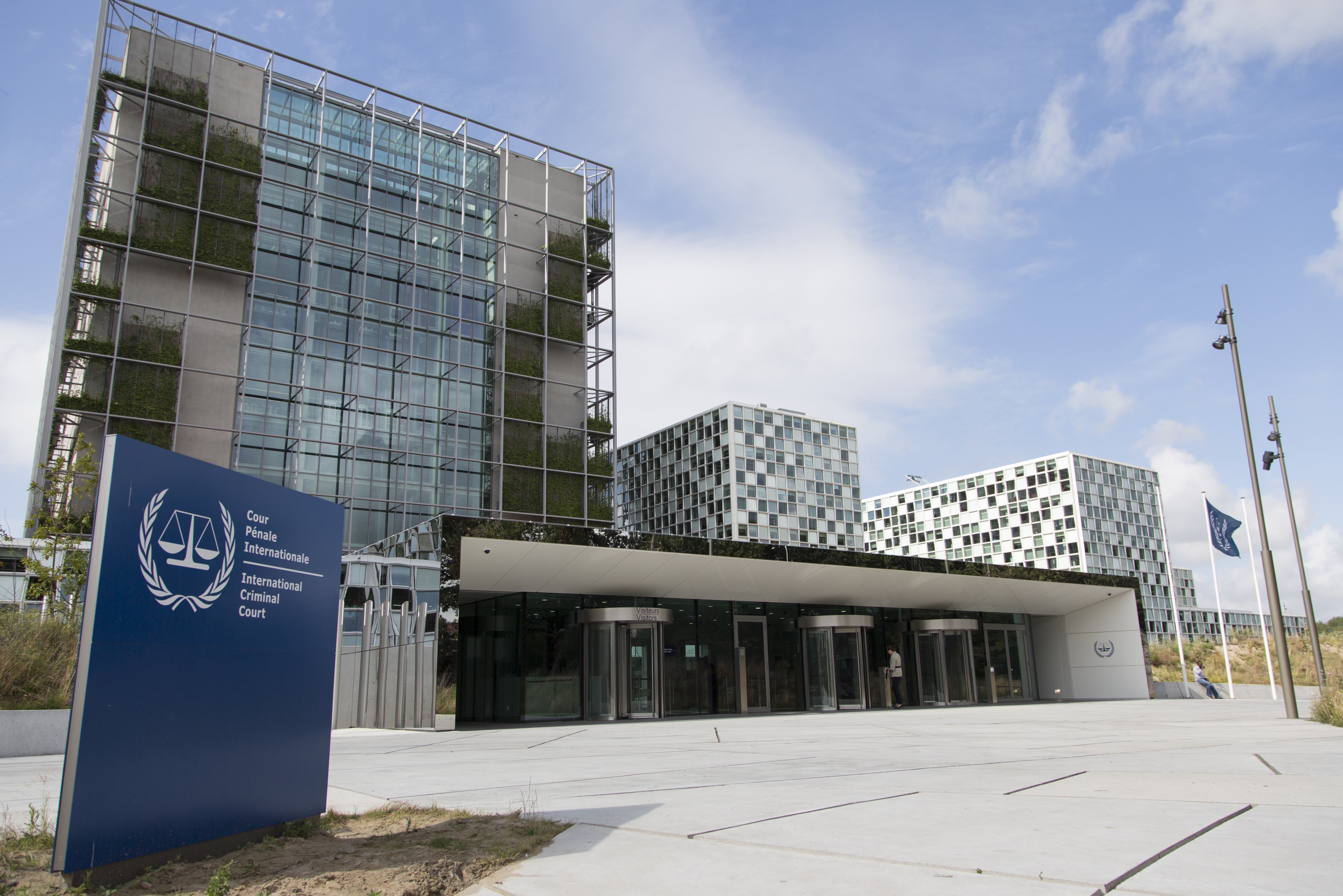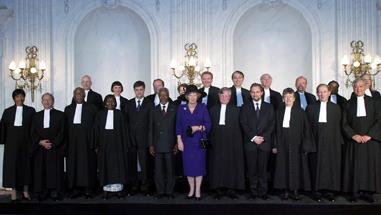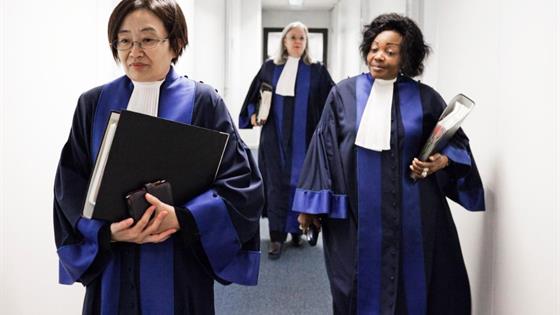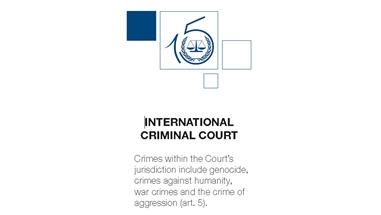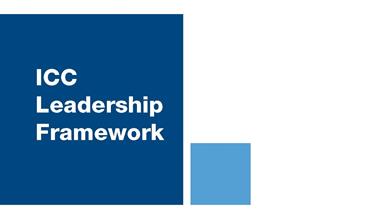
Find useful resources for your research or next presentation.
Core ICC texts
The core legal texts are the seven documents that together form the basis of the Court’s legal framework: the Rome Statute of the International Criminal Court (Statute), the Rules of Procedure and Evidence, the Elements of Crimes, the Regulations of the Court, the Regulations of the Registry, the Regulations of the Office of the Prosecutor and the Code of Professional Conduct for counsel. The most important of these, and first to be adopted and enter into force, was the Statute, following which the remaining six texts entered into force at various points during the Court’s history. All can be amended according to their own particular amendment procedure.
Rome Statute of the International Criminal Court (Statute)
Download: English, Français, العربية,Español
The Rome Statute of the International Criminal Court is the international treaty that founded the Court. Comprising a Preamble and 13 Parts, it establishes the governing framework for the Court. Adopted at the Rome Conference on 17 July 1998, it entered into force on 1 July 2002, thereby creating the International Criminal Court. See our history.
The Statute sets out the Court's jurisdiction over genocide, crimes against humanity, war crimes and – as of an amendment in 2010 – the crime of aggression. In addition to jurisdiction, it also addresses issues such as admissibility and applicable law, the composition and administration of the Court, investigations and prosecution, trials, penalties, appeal and revision, international cooperation and judicial assistance, and enforcement.
Rules of Procedure and Evidence (Rules)
The Rules of Procedure and Evidence are an instrument for the application of the Rome Statute. Subordinate to the Statute, they provide for the composition and administration of the Court, setting out rules governing jurisdiction and admissibility, stages of proceedings and trial procedure, investigation and prosecution, penalties, appeal and revision, offences and misconduct against the Court, compensation, international cooperation and judicial assistance, and enforcement.
Elements of Crimes
Download: English, Français, Español
The Elements of Crimes were adopted to assist the Court in interpreting and applying articles 6-8bis of the Statute, which establish the crimes within the jurisdiction of the Court. In particular, they set out the jurisdictional, material and mental elements that must be present in order for a person to be held criminally responsible and liable for punishment for those crimes.
Regulations of the Court
The Regulations of the Court set out the framework necessary for the routine functioning of the Court. Subject to both the Statute and the Rules, they regulate aspects of the composition and administration of the Court, proceedings before the Court, counsel issues and legal assistance, victims participation and reparations, detention matters, cooperation and enforcement, removal from office and disciplinary measures.
Regulations of the Office of the Prosecutor
Download: English, Français, عربي
Like the Regulations of the Registry, the Regulations of the Office of the Prosecutor are subject to the Statute, the Rules and the Regulations of the Court. They govern the operations of the Office of the Prosecutor in relation to its management and administration, providing for divisions and sections within the Office, and regulating the handling of information and evidence, preliminary examination and evaluation of information, investigations, proceedings before the Chambers and trials.
Regulations of the Registry
Download: English, Français, Español, عربي
The Regulations of the Registry, subject to the Statute, the Rules and the Regulations of the Court, govern the operation of the Registry by providing for its organization and management. They set out how the Registry will perform its administrative duties regarding proceedings before the Court and how it will discharge its responsibilities regarding issues of legal representation and assistance, victims and witnesses, and detention matters.
Code of Professional Conduct for counsel
Download: English, Français, Español, عربي
The Code of Professional Conduct for counsel, adopted by the Assembly of States Parties, applies to defence counsel, counsel acting for states, amici curiae and counsel for victims and witnesses practising at the Court. It governs the conduct of counsel in their representation of clients and relations with the Court, other counsel, persons who are unrepresented or represented by other counsel, and victims and witnesses. It also establishes a disciplinary regime for misconduct.
Code of Judicial Ethics
The Code of Judicial Ethics provides guidelines for general application to contribute to judicial independence and impartiality with a view to ensuring the legitimacy and effectiveness of the judicial process. To this effect the Code contains guidelines on the conduct of Judges relating both to their professional roles, for example by acting with integrity, respecting confidentiality and regulating the conduct of those participating in courtroom proceedings, and in their activities outside the Court.
Chambers Practice Manual
13 July 2023 - English, Français
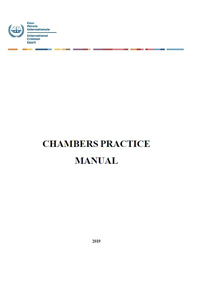
This update adds a new section to the Chambers Practice Manual on principles and procedures governing the issuance of dissenting and separate opinions. Such principles include that dissenting and separate opinions should be a measure of last resort. Other issues addressed are the length of dissenting and separate opinions and their issuance together with the majority judgment, decision or order. Where appropriate, dissenting or separate views may be included together with that of the majority in a single document. The new section also devises an internal procedure reflecting best practices on the preparation of dissenting and separate opinions.
The seventh revision of the Chambers Practice Manual is the result of collective discussions held at the judicial retreat of the judges in June 2023, where the judges examined various recommendations made in the Report of the Independent Expert Review (‘IER’) conducted in 2020. At the retreat, the judges shared best practices on the issuance of dissenting and separate opinions and agreed to incorporate internal guidelines into the Chambers Practice Manual. The topic of separate and dissenting opinions was addressed in IER recommendations 221-224.
Guidelines for the Judiciary Concerning the Holding of Court Hearings during the COVID-19 Pandemic
The Guidelines are facilitative and non-binding, aiming to provide clarity on the Court’s approach to holding hearings in Court proceedings during the COVID-19 Pandemic. The Guidelines emphasise that the applicable Chamber may decide independently whether required hearings should be conducted physically, remotely or as a combination of both. A Chamber should consider the rights and protections guaranteed in the Rome Statute and the Rules of Procedure and Evidence, as well as giving due consideration to the situations and restrictions in states where parties or participants in the hearings are located.
The Staff Regulations
The Staff Regulations were adopted by the Assembly of States Parties, in accordance with article 44(3) of the Rome Statute. They broadly outline the principles and policies that apply to all Court staff. They do not apply to elected officials such as the Judges, the Prosecutor and the Registrar. The Regulations provide for the duties, obligations and privileges of Court staff and establish guidelines for matters such as the classification of posts and staff, salaries and allowances, appointment and promotion of staff, leave entitlements, social security, staff expenses, staff relations, separation of service, disciplinary measures, appeal of administrative decisions and recruitment.
Staff rules of the International Criminal Court
The Staff Rules of the International Criminal Court elaborate on the Staff Regulations and apply to all staff members with a fixed-term appointment including, subject to another resolution, to staff of the Secretariat of the Assembly of States Parties. They provide more detailed provisions on the issues dealt with in the Regulations.
The Financial Regulations and Rules
The Financial Regulations and Rules were adopted by the Assembly of States Parties in accordance with article 113 of the Rome Statute and outlines the rules and regulations that govern the financial administration of the Court. The Regulations deal with matters such as the creation of a proposed budget for approval by the Assembly of States Parties, appropriations, the provision of and management of funds and other income, internal control of the Court’s finances, accounting methods and auditing of the Court’s accounts. The Rules elaborate on these by providing detail on how the Regulations are to be implemented. An annex to the Rules and Regulations sets out the terms of reference for the auditor appointed by the Assembly of States Parties to audit the Court.
The Agreement on the Privileges and Immunities of the International Criminal Court
This Agreement between States Parties elaborates on articles 4 and 48 of the Rome Statute that refer to the legal personality of the Court and its privileges and immunities in the territory of States Parties. The Agreement provides that the Court’s premises, archives, documents and communications are inviolable; that its property, funds and assets are immune from legal processes and it is exempt from taxes and customs. The Agreement also details the immunities that various groups of personnel working with or attending the Court, such as Representatives at the Assembly of States Parties, Judges, Counsel, Witnesses and Victims, are entitled to.
The Agreement between the International Criminal Court and the United Nations
This Agreement was concluded pursuant to article 2 of the Rome Statute in order to provide for a mutually beneficial relationship between the two organisations. This is done through recognition of and respect for each other’s mandates, reciprocal representation, exchange of information and cooperation between the organisations on matters of personnel, administration, facilities and services, including access to UN venues.
The Headquarters Agreement with the Host State
This Agreement was concluded between the Court and the Netherlands to regulate matters regarding the establishment of the Court in The Hague. It aims to ensure the stability, independence and smooth functioning of the Court and the Secretariat of the Assembly of States Parties in the Netherlands. In addition to detailing the immunities and privileges that the Court and its officials, staff and related personnel enjoy, the Headquarters Agreement regulates the provision of services, such as electricity, water and fire protection to the Court as well as security of the Court premises and its personnel. It also deals with the facilitation of entry into the Netherlands of those required to travel to the Court, visitors of detainees and other stakeholders, such as NGOs and press and contains provisions regulating the transport, detention and release (interim or otherwise) of detainees.
Official Journal
The Official Journal of the ICC was created and published pursuant to regulations 7 and 8 of the Regulations of the Court, and contains the texts listed in these regulations and any other material as decided by the Presidency in consultation with the Prosecutor and/or the Registrar.
- Core Legal texts
- International Agreements
- Other
Referrals and declarations
Referrals
According to the Rome Statute, a State Party or the United Nations Security Council acting under Chapter VII of the UN Charter can refer a situation to the ICC Prosecutor in which one or more of crimes under the ICC jurisdiction appear to have been committed. It is then up to the Prosecutor to decide whether or not to open an investigation.
States Parties
- Central African Republic I, 7 January 2005 | Referral
- Central African Republic II, 31 May 2014 | Referral
- Comoros, 14 May 2013 | Referral
- Democratic Republic of Congo, 19 April 2004 | Referral
- Mali, 13 July 2012 | Referral
- Uganda, 29 January 2004 | Referral
United Nations Security Council
- United Nations Security Council resolution 1593, 31 March 2005 (situation in Darfur, Sudan)
- United Nations Security Council resolution 1970, 26 February 2011 (situation in Libya)
Declarations lodged under article 12(3)
Pursuant to article 12(3) of the Rome Statute, a State which is not party to the Rome Statute may accept the exercise of the Court's jurisdiction by lodging a declaration with the ICC Registrar.
- Côte d'Ivoire, 18 April 2003 | First declaration by the Government of Côte d'Ivoire
- Côte d'Ivoire, 14 December 2010 and 3 May 2011 | Declarations by the Presidency of Côte d'Ivoire reconfirming the country's acceptance of the ICC jurisdiction
- Palestine, 31 December 2014 | Declaration by Palestine
- Ukraine, 17 April 2014 | First declaration by Ukraine
- Ukraine, 8 September 2015 | Second Declaration by Ukraine
Declarations lodged under article 15bis(4)
Pursuant to Article 15 bis (4) of the Rome Statute, a State Party can declare that it does not accept the ICC jurisdiction regarding the crime of aggression by lodging a declaration with the ICC Registrar.
Legal Tools
The Legal Tools Project aspires to equip users with the legal information, digests and software required to work effectively with international criminal law.
It seeks to serve as a complete virtual library on international criminal law and justice. The Tools comprise the largest online collection of relevant documents and legal digests available through the Case Matrix application. Some 13 collections of legal documents are included, together with four legal research and reference tools developed by lawyers connected with the Court and external partners: the Case Matrix, the Elements Digest, the Proceedings Digest and the Means of Proof Digest.
Administrative Issuances
Administrative issuances by topic: (i) Staff Regulations, (ii) Staff Rules, (iii) Financial Regulations and Rules, (iv) Presidential Directives, (v) Administrative Instructions, (vi) Information Circulars, and (vii) other relevant policies and guidelines. Within each category, the documents are presented in chronological order, from the earliest to the most recent.
It provides a comprehensive index of all documents covered: with 31 categories and more than 400 sub-categories, the Index maps all relevant sources governing the Court's administration, from Human Resources issues to professional conduct, security, procurement, etc.
Guidelines on intermediaries
The ICC uses the below guidelines in interacting with intermediaries, particularly those entities and individuals that support the Court's activities, particularly local actors in the field, who assist with, among other activities, the safety of victims and witnesses.
- Questions and Answers on the Court's engagement with intermediaries
- Guidelines Governing the Relations between the Court and Intermediaries for the Organs and Units of the Court and Counsel working with intermediaries (March 2014)
- Code of conduct for intermediaries (March 2014)
- Model contract for intermediaries (March 2014)
With the exception of the model contract, these guidelines are not legally binding. They include a built-in review mechanism for amending as required.
The aim of the Guidelines is fourfold:
- to preserve the integrity of the judicial process to the maximum extent possible;
- to provide guidance to staff of the Court and improve efficiency of the Court's operations;
- to provide transparency and clarity for third parties who may interact with the organs or units of the Court or Counsel; and
- to provide guidance on the relationship between the Court and intermediaries.
Strategies and Reports on activities
Latest reports
Information products
Use these resources in your next presentation on the ICC and share your presentations with us.

